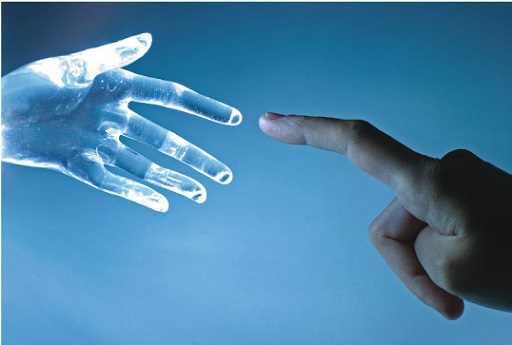5 Caring robots
You will already have considered some of the benefits and challenges associated with implementing digital health care and promoting its wider use. But what about artificial intelligence (AI)? That is, the use of intelligent machines that work and react like humans.

AI is not new. Passport control employs facial recognition techniques, and voice recognition on virtual assistants such as Alexa and Siri are a part of everyday life. Driverless cars and ‘companion robots’ that care for the frail and elderly are currently undergoing trials. Google’s DeepMind has taught machines to read retinal scans with at least as much accuracy as an expert (Galeon, 2016).
While AI is said to bring more relief to many of the pressures the healthcare system faces, can AI ever replace human care? This is the focus of the next activity, in which you will explore the extent to which AI can be ‘culturally competent’, i.e. being sensitive and aware of the needs of different cultures and responding appropriately.
Activity 5 Can artificial intelligence care?
Watch the video by CARESSES, a company that is developing a robot that provides care for the elderly, then answer the questions that follow.

Transcript: Video 4 CARESSES, the Flower that Taught Robots about Culture
- Would you be prepared to use a robot to help you with a disability? For example, in the case of memory loss the robot would remind you to take your medication and to contact family and friends.
- Do you think robots can truly replace humans in the care of the elderly?
Discussion
While AI can bring about significant benefits and opportunities, there are a number of implications. A central concern raised by the Academy of Royal Colleges Report (2019) is whether AI will make patients safe or safer. This is the focus of the next activity.
The next activity asks you to critically evaluate two sides of an argument and also to consider the practical and ethical implications of using AI.
Activity 6 Doing my job
Think about the place of the usefulness of robots to the social care profession. What do you think the implications would be for a professional working in health and social care?
Discussion
You may have thought that it was a good idea to have the involvement of robots as it may help people who are frail to remain in their own home for longer as the robot would be on call to conduct certain tasks. However, you might argue that human contact, affection and compassion cannot be simulated by a robot. Moreover, robots could have implications for people’s jobs and threaten livelihoods. There is also the issue about the extent to which artificial intelligence can ever truly be safe. This is the focus of the next activity.
Activity 7 AI and the patient: safe or safer?
Read pages 11 and 12 from the Academy of Medical Royal Colleges report Artificial Intelligence in Healthcare [Tip: hold Ctrl and click a link to open it in a new tab. (Hide tip)] about Patient Safety. Use this information to complete the table below.
What are the practical and ethical advantages and disadvantages that can arise from using AI in health care for the following factors?
| Factors | Advantages | Disadvantages |
|---|---|---|
| 1. Reliability and safety | ||
| 2. Efficiency | ||
| 3. Data management, accountability and security | ||
| 4. Effect on patient | ||
| 5. Effect on health professional | ||
| 6. Trust |
Discussion
Advantages
Reliability and safety
Unlike humans, machines are designed to keep going; they don’t require sleep which means they can be available to assist any time of the day or night, which is important for anyone needing help. Going digital offers a solution to variation in patient care.
Efficiency
Providing digital consultations enables patients to access services irrespective of where they live. This is especially helpful for people who live in rural areas where services may be more limited. Patients don’t have to rely on a specific appointment which means they access a service at a time which is convenient for them. This type of service is particularly useful for those who may experience communication difficulties.
Data management, accountability and security
Algorithms ensure that the latest guidelines are imported into a system, so that all information contained within it is kept constantly up-to-date. It does not need manual involvement – it is able to update itself, saving the need to use manual labour. This also means that tests and prescriptions are also kept up-to-date.
Effect on patient
Artificial intelligence can improve healthcare access and can save people from having to travel for appointments because they can receive any information and advice wherever they are. It is also important for health professionals as it can identify if a patient may be in danger and alert a health professional to intervene.
Effect on health professional
Providing clinical care in a digital format enables health professionals to deliver health care which is standardised which reduces the potential for any negative impact on a patient’s health and care.
Trust
Can rely on being kept up to date with the latest information and guidelines.
Disadvantages
Reliability and safety
Much of the advice and decisions that doctors make about a patient’s health are based on what they know about the patients. This not only includes information about their medical condition but how this is affected by other factors such as their personal life and behaviour. Knowing this information enables a doctor to tailor the type of treatment and support they can offer which can vary from one individual to the next. Algorithms which tend to standardise systems are unable to do this.
Efficiency
It is difficult to judge how safe any AI can be. If it is not programmed well it can create problems and could be used inappropriately. If it is poorly programmed it is unlikely to be efficient because the data it needs to work well might not be complete, potentially leading to inaccurate advice.
Data management, accountability, and security
Just like any system, AI is vulnerable to abuse and security breaches. There is also the issue of who is accountable if something goes wrong with the software or if information is leaked out. Is it the technology company who designed it? Or is it up to the regulator to ensure everyone is trained in how to use the technology safely and securely? There is no indication about who should be ultimately responsible, which means there is a lack of accountability. There is also the issue about who is in charge. Is it the doctor who has precedence over an AI’s decision?
Effect on patient
While AI will be helpful for some people it could cause harm to others.
Effect on health professional
Health professionals are trained to possess certain clinical skills in order to deliver health and care. Therefore, the information guide and any training in how to use available technology to manage health needs to be good. If it isn’t, this can lead to frustration and a lack of engagement with the technology – even for a technological wizard.
Trust
It could be difficult to trust an AI as they won’t be able to discern between what seems to be good medical advice and the patient’s wishes. This is important because a patient may not follow the advice of an AI that recommends something they find difficult to do or take.
Clearly, there are several ways AI can offer solutions to pressing health concerns, but it also has implications for issues such as security of some highly sensitive and personal information.
In the next section, the focus turns to the way digital innovation is delivered across four nations and the way this has transformed both the relationship between a person and a health professional and its impact on health service delivery.
